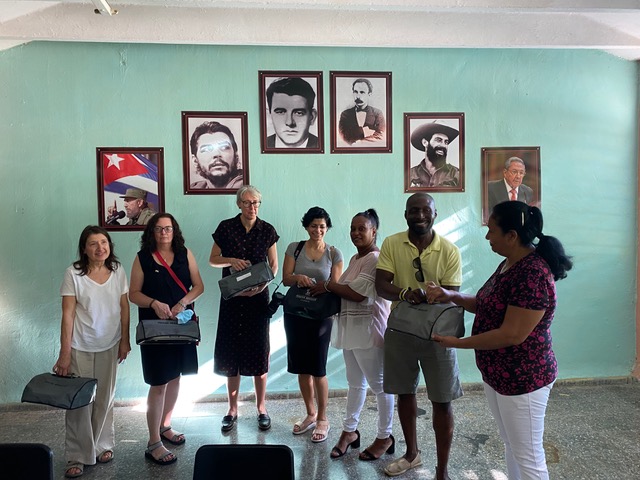NEU delegation to Cuba
Campaign News | Tuesday, 22 November 2022

Delegation members at the Abel Santamaría School for the Blind and Visually Impaired
In the last week of October a delegation of 22 members of the National Education Union (NEU) went to Cuba to visit schools, talk to teachers and fellow trade unionists about the challenges education in Cuba faced because of the ongoing blockade by the United States of America and how they had coped with the COVID pandemic. The visits centred on Havana and Pinar del Rio in the west of the island.
The group visited two primary schools, two secondary schools, a music specialist school, two schools for the blind and visually impaired, a school for autistic children and a university. Alongside this they met national and local members of the SNTECD (the Cuban education union) and the CTC (Cuban TUC).
In Pinar the group saw for themselves the impact of Hurricane “Ian” – a Category 3 storm which had blown roofs off houses, uprooted trees, flooded roads, cut the electricity supply and destroyed many of the local crops including the tobacco used to produce the famous Cuban cigars. Pinar’s university was acting as a temporary home for some families whose houses were being restored.
Despite the challenges more than 4,000 volunteers had been mobilised from across the island to help repair the damage. By the time the delegation arrived, two weeks after the hurricane, nearly 50% of the electricity was back and confidence was high that full restoration of supplies would be achieved in a matter of a few weeks.
During the last two years of COVID the Cuban education system continued working. Children remained at home and lessons were delivered using television with two dedicated education channels. Teachers made home visits to check how children were and to make sure they had the resources to follow the programmes. Today all children are back in school.
What shone through in all the schools was the quality of the relationships between teachers and children, children and children and all of the staff in the schools. Whilst the schools are desperately short of material resources – even simple things such as paper and pencils – the commitment to education in Cuba is incredible and this was very evident as we went into every school. Around 24% of the government’s budget is devoted to education.
This commitment is very evident in the human resources devoted to education. In the Dora Alonso Autism school the pupil teacher ratios and staffing put those in Britain to shame. In a school of 108 pupils there were 47 teachers, 4 speech therapists, 3 psychologists and a physiotherapist. In addition there were 24 non-teaching staff of which 4 were ex-pupils. There were 13 classrooms and a specialist physical therapy room.
However the school took a broader approach to the tasks they faced. In addition to the work in the classrooms, there were monthly meetings for the families, as well as home visits together with workshops for the parents, grandparents and siblings. Families could also access respite by joining other families on organised “breathing days”.
Some members of the delegation left the visit to the school in tears at the incredible human input they saw together with the personal commitment and care shown by the staff of the whole school towards the children and their families. The collective aim is to reintegrate the children full time into the appropriate age-related schools which they continued to attend part time whilst at the Dora Alonso school.
In the rural area of Viñales, in Pinar del Rio, the group visited a primary school where classes were under 15 in each age group. One of the teachers, a teacher of English, had recently joined the staff from her previous primary school where she had been the sole teacher with one child in the school. When the child was older and the parents confidant for them to travel, the child had joined the local primary school with the other children. In Britain rural schools like this would be closed down and the children bussed to other schools.
Music was everywhere in Cuba not least in the schools. In the Manuell Saumell Music school in Havana, the delegation saw children playing a range of instruments, performing both traditional Cuban styles and classical pieces. This scene was repeated in Pinar del Rio where children in the secondary school of performing arts sang, danced and played an array of instruments. The whole event culminated in everyone, visitors included, joining a conga out of the room and round the school.
There is no doubt that education is highly valued in Cuba. That teachers are respected and children valued for their individuality and that they have a real sense of joy at being in school.
For more than 60 years Cuba has faced a blockade by the United States of America. There is no doubt that this has an impact on schools. Cuba cannot buy even the most basic materials for use in schools – paper and pencils, computers. Special schools are hit in a variety of ways - children who need cochlea implants or electric wheelchairs cannot get them. That is why in conjunction with the NEU’s sister union in Cuba and the Cuba Solidarity Campaign the Viva La Educacíon Campaign has been launched to raise money to bulk buy material aid to send to Cuba. I hope that every reader of Cuba Sí will contribute to this campaign and give generously.
Bernard Regan, NEU Member and Secretary Cuba Solidarity Campaign






